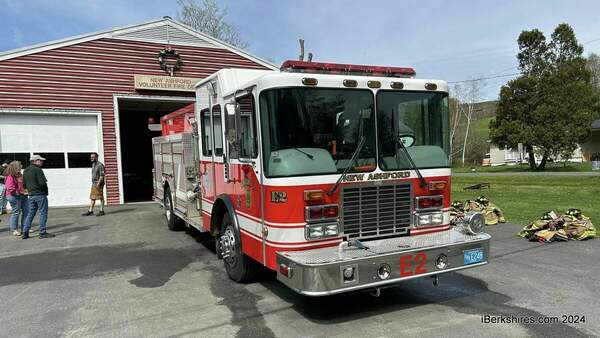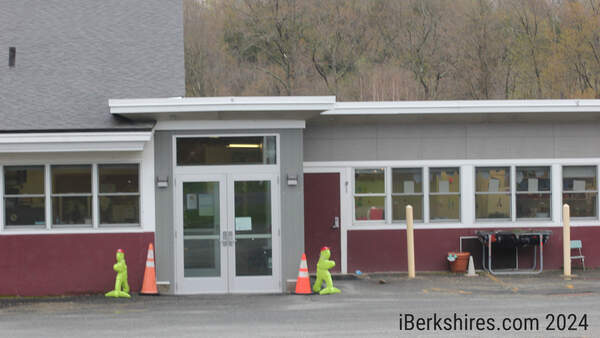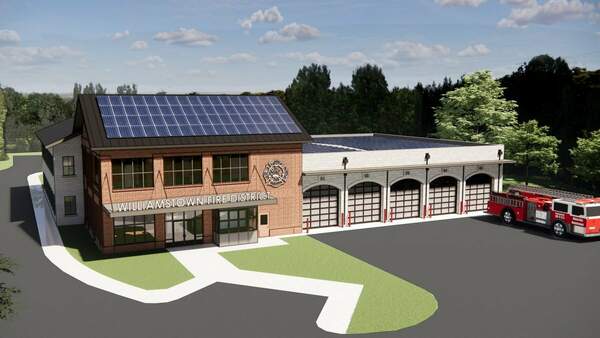Williamstown CPC Recommends Requests to Town Meeting
 Pages from the 1753 Proprietors' Meeting Book that the Williamstown Historical Museum hopes to conserve with funds from the Community Preservation Act. Pages from the 1753 Proprietors' Meeting Book that the Williamstown Historical Museum hopes to conserve with funds from the Community Preservation Act. |
WILLIAMSTOWN, Mass. — The Community Preservation Committee on Tuesday approved three funding requests that will go to annual town meeting in May.
After the withdrawal of an application from the town's Conservation Commission, the committee faced just three applications totaling $45,542 for funds generated by the Community Preservation Act property tax surcharge adopted by town meeting in 2002.
The largest request is from the Sand Springs Recreation Center, which is seeking $18,923 to install a heater and pool cover at the historic Sand Springs Pool. The Trustees of Reservations are seeking $15,400 for restoration of furniture and woodwork at the Bloedel house at Field Farm. The Williamstown Historical Museum is asking for $11,219 for the preservation and exhibition of the town's 1753 "Proprietors' Meeting Book."
A fourth request, for funding to restore bridges on hiking trails, was withdrawn by the Conservation Commission.
Of the three remaining requests, only the museum's was approved unanimously to recommend to town meeting, although the objections stemmed not so much from the merits of the proposals as a desire to conserve CPA funds for potentially larger projects down the road.
After the committee agreed unanimously that each of the projects on the table is worthy, committee member Chris Winters reminded his colleagues that any request must be weighed not only on its merits but also against the "opportunity cost" of saving for another year.
Winters mentioned projects like the acquisition of development rights on large tracts of land or the construction of future affordable housing projects as the kinds of things that would require large reserves.
Jeffrey Thomas agreed.
"It's my observation of how this committee operates that it's easier to fund projects than not to fund them," Thomas said.
During the subsequent discussion that preceded a second round of voting on the whether to recommend the projects to town meeting, committee members voiced similar concerns but said this year's applicants had compelling cases.
"I'm increasingly inclined to take seriously the concern Chris expressed," Mark Reinhardt said in a meeting telecast on the town's community access television station, WilliNet. "[The museum request] is an area where it makes sense to spend a small amount of money now.
"I do agree we need to take the opportunity to set money aside. This is a case where it would be pennywise but pound foolish."
Later, during the discussion of the evening's third and final request, Town Manager Peter Fohlin, a voting member of the committee, indicated that he did not think any of the applications this year were good candidates for belt-tightening.
"I'm looking for a project I can vote 'No' on and stay true to my principles," Fohlin said. "I'm 0-for-2 so far tonight."
Fohlin made the remark while discussing the Sand Springs proposal, which was approved by the committee on a 5-2-1 vote (committee member and Selectwoman Jane Patton is interim executive director at Sand Springs and recused herself from the vote).
The recreation center is asking the town to fund the bulk of a $21,000 project to heat the pool in order to bring it in line with American Red Cross recommendations for pool temperatures during morning swim lessons and to install a lift to help users with disabilities access the pool.
Janette Kessler Dudley of the Sand Springs Board of Directors said the center was lowering its request by about $8,300 since submitting the initial request because the board concluded it could do without one of the planned heaters.
To address specific concerns raised by a committee member at a
prior meeting, Kessler Dudley turned to consultant Bill Greenwald of Greenwald Pragmatics.
Greenwald said he could not guarantee Sand Springs would be able to maintain a water temperature of 84 degrees throughout its season while keeping within a self-imposed budget of $5,000 for fuel because there are too many variables. However, he expressed reasonable confidence that it would come close.
"I think it will be very close if not exceed the 84-degree number, considering we're going to concentrate the heating during the swim-lesson hours, which is only during the morning," Kessler Dudley said. "If we run out of money, we'll stop the swim lessons.
"We plan to operate the swim program for eight weeks. We can operate for those weeks at 84 degrees."
And if that means going over the $5,000 budget, the recreation center does have a reserve fund, Kessler Dudley said, in answer to a question from Chairman Philip McKnight.
A more principled concern was raised by Reinhardt.
"For roughly a century, there's been no heat in the pool," he said. "Now, when everyone is worried about fossil fuels and global warming, we're going to heat it? Is that something we should be concerned about?"
Kessler Dudley said the Sand Springs board considered that question itself. Its acquisition of a pool cover as part of the project is intended to reduce heat loss, and it is exploring a partnership in a proposed community solar farm in order to reduce the center's carbon footprint.
The Trustees of Reservations' Mark Wilson was back before the committee on Tuesday to report that the Bloedel House furnishings had been certified as historically significant by the town's Historical Commission, as the committee had previously requested.
Wilson faced new questions from Fohlin about whether the Trustees had sought other sources to finance the restoration.
"This is an example of an application where I feel as though the CPC is the funding source of first resort rather than the funding source of last resort," Fohlin said. "I'd like to not be everyone's first choice of funding."
Wilson told the committee the Trustees previously had solicited private donations and regularly conducts statewide fundraising campaigns. He also said the Beverly-based non-profit has worked with CPA funds in other communities throughout the commonwealth, notably in Stockbridge and Great Barrington.
Fohlin joined a 6-1-1 majority in approving the request.
Tags: community preservation, CPA, historical documents, museum, Sand Springs, swimming, town meeting 2016,
 Pages from the 1753 Proprietors' Meeting Book that the Williamstown Historical Museum hopes to conserve with funds from the Community Preservation Act.
Pages from the 1753 Proprietors' Meeting Book that the Williamstown Historical Museum hopes to conserve with funds from the Community Preservation Act.














